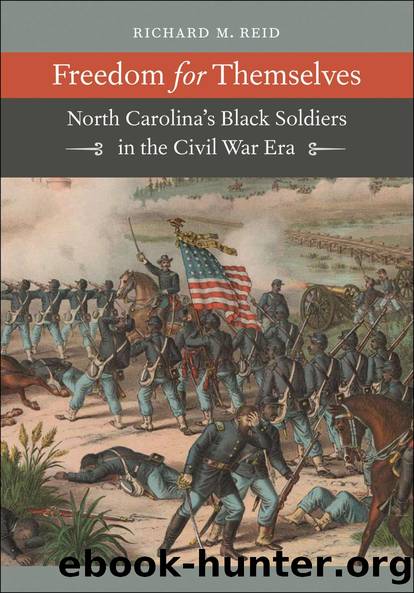Freedom for Themselves by Richard M. Reid

Author:Richard M. Reid [Reid, Richard M.]
Language: eng
Format: epub
Tags: History, General
ISBN: 9781458719058
Google: h1FMERgRzCgC
Publisher: ReadHowYouWant.com
Published: 2009-09-16T16:00:03+00:00
CHAPTER SIX
Families of the Soldiers during the War
For many African Americans who volunteered to serve in North Carolinaâs Union regiments, enlistment was a time fraught with worries about the families, friends, and dependents they were leaving behind to an uncertain fate. As black Union soldiers from Southern states, not only did they face higher risks if captured by Confederate troops, but also their families, either at home or in refugee camps, could find themselves in equally perilous situations. The Unionâs white soldiers from the North could expect that, in their absence, their families would receive support and assistance from their local community, their state government, and Federal agencies. If they were killed or seriously wounded in battle, some aid would be provided for those left behind. At the very least, family members would enjoy the respect of their society for the sacrifice their men were making. Moreover, many of these men and their families had financial resources that would help buffer dependents from privation while the war lasted. The African American soldiers from North Carolina and elsewhere in the South had no such assurances. As a group, they had few financial resources to support their immediate families in their absence. Moreover, their dependents could expect few benefits from the state or the Federal government and, in the worst case, their families might face retaliation from Confederate supporters for the actions of the black soldiers.
Not surprisingly, the wartime experiences of the families of black soldiers from across the South varied enormously. In many parts of North Carolina, young African American males of military age who wanted to enlist had been able to escape from Confederate territory only by leaving their families and friends behind. After they entered the Union army, their fears for dependents who remained in bondage must have been great, especially when owners reportedly were relocating their slaves to less threatened parts of the Confederacy.1 Certainly some of these soldiers made many attempts to return and retrieve their loved ones. Others had been fortunate enough to escape with their family members but only by becoming refugees. Still other African Americans were effectively freed after 1862, as Union forces occupied vital areas in eastern North Carolina. While life for them continued to be hard, at least it was slightly more stable than for the refugees. For all blacks in Union-occupied territory, the war created a wider range of occupational choices than had existed previously. Some families remained in the cities and towns held by Federal troops, sustaining themselves through employment opportunities opened up by the military presence. Many black entrepreneurs managed to become relatively well off and, by the end of the war, some of these tradesmen and businessmen earned hundreds of dollars.2 They were the fortunate minority. Often black laborers worked long and hard for wages that were never paid. Other ex-slaves, however, took advantage of the Federal armyâs encouragement of black recruitment in North Carolina. When Gen. Edward Wild began to enlist black recruits from the Union-occupied area, he promised the soldiers that their dependents would receive support during the war.
Download
This site does not store any files on its server. We only index and link to content provided by other sites. Please contact the content providers to delete copyright contents if any and email us, we'll remove relevant links or contents immediately.
| Africa | Americas |
| Arctic & Antarctica | Asia |
| Australia & Oceania | Europe |
| Middle East | Russia |
| United States | World |
| Ancient Civilizations | Military |
| Historical Study & Educational Resources |
Cat's cradle by Kurt Vonnegut(15339)
Pimp by Iceberg Slim(14489)
4 3 2 1: A Novel by Paul Auster(12377)
Underground: A Human History of the Worlds Beneath Our Feet by Will Hunt(12090)
The Radium Girls by Kate Moore(12019)
Wiseguy by Nicholas Pileggi(5771)
The Fire Next Time by James Baldwin(5432)
Perfect Rhythm by Jae(5398)
American History Stories, Volume III (Yesterday's Classics) by Pratt Mara L(5301)
Paper Towns by Green John(5181)
Pale Blue Dot by Carl Sagan(4996)
A Higher Loyalty: Truth, Lies, and Leadership by James Comey(4955)
The Mayflower and the Pilgrims' New World by Nathaniel Philbrick(4495)
The Doomsday Machine by Daniel Ellsberg(4485)
Killers of the Flower Moon: The Osage Murders and the Birth of the FBI by David Grann(4443)
The Sympathizer by Viet Thanh Nguyen(4385)
Too Much and Not the Mood by Durga Chew-Bose(4338)
The Borden Murders by Sarah Miller(4315)
Sticky Fingers by Joe Hagan(4189)
